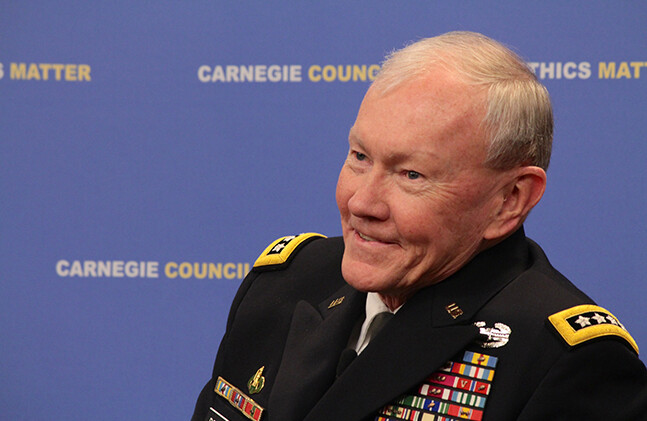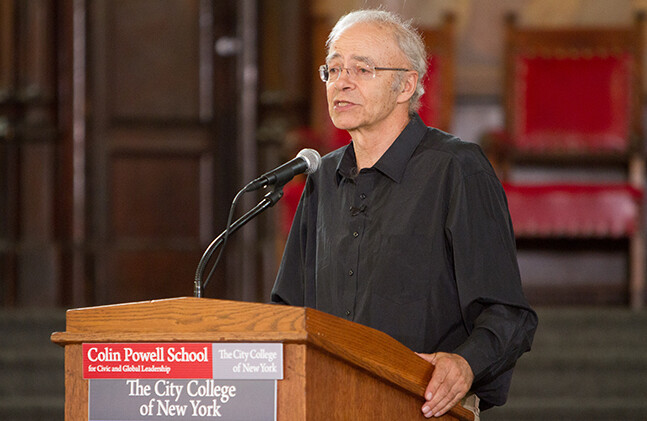Framing ethical perspectives
Applied ethics refers to the practical applications of the moral principles that govern behavior. Carnegie Council focuses on this field, mostly through the realm of international affairs, by identifying and addressing the most critical ethical issues of today and tomorrow. Our initiatives, content, and experts analyze the way that governments, institutions, and individuals interact and make choices on global issues, such as climate change, emerging technology, and governance.
Featured Applied Ethics Resources
Practical conversations, decision analysis, and more
MAY 10, 2022 • Podcast
Making Decisions When Values Conflict or Are Prioritized Differently, with Paul Root Wolpe
JUL 5, 2023 • Article
A Framework for the International Governance of AI
Carnegie Council, in collaboration with IEEE, proposes a five-part AI governance framework to enable the constructive use of AI.
APR 12, 2022 • Podcast
Surveillance Tech's Infinite Loop of Harms, with Chris Gilliard
In this discussion with Senior Fellow Arthur Holland Michel, Chris Gilliard explains why the arc of surveillance technology and novel AI bends toward failures that ...
Related Initiatives
Carnegie Ethics Accelerator
The Carnegie Ethics Accelerator is a new kind of incubator designed to empower ethics in the face of swiftly evolving challenges in technology and public policies.
Ethics & International Affairs Journal
Ethics & International Affairs is the quarterly journal of Carnegie Council. It aims to close the gap between the theory and practice of ethics.
Carnegie Ethics Fellows
The Carnegie Ethics Fellows program (CEF) seeks to cultivate the next generation of ethical global leaders across business, policy, technology, NGOs, and academia.
Explore Our Applied Ethics Resources
DEC 16, 2014 • Podcast
The Business of Humanitarian Aid and Philanthropy: A Case Study
By using a single organization, SaveLIFE Foundation in India, as a case study, this episode of Impact explores how NGOs in emerging markets adopt business ...

DEC 15, 2014 • Article
Public Health in Brazil
Few countries in the world match Brazil's pledge to provide universal, free health care as a constitutional right. This promise extends far beyond routine check-ups ...

DEC 3, 2014 • Podcast
An Introduction to Centennial Ebook of Roundtables from "Ethics & International Affairs"
In this podcast, Zach Dorfman introduces the Centennial collection of roundtables on the most critical issues facing the world today: the idea of a global ...

NOV 20, 2014 • Podcast
Michael Ignatieff in Conversation with Paul Holdengräber at the NYPL
Carnegie Council Centennial Chairman Michael Ignatieff, a Canadian writer, teacher, and former politician, discusses his life, his work, and the Council's Centennial project, Ethics for ...

NOV 14, 2014 • Podcast
A Conversation with David Keyes on Advancing Human Rights
In the Soviet era, it was difficult to alert the world of what was happening to dissidents, says David Keyes. Today, however, there's an overload ...

NOV 11, 2014 • Podcast
A Conversation with Will Kymlicka on the Challenges of Multiculturalism
From Canada to Europe, how do different societies deal with immigrant groups? How have their policies evolved and where are they headed? What rights should ...

NOV 7, 2014 • Podcast
A Conversation with General Martin Dempsey, Chairman of the Joint Chiefs of Staff
In this candid and thoughtful conversation, General Dempsey tackles the difficult questions, from ISIS to Ebola to cyber threats. And throughout, he stresses the importance ...

NOV 7, 2014 • Podcast
Global Ethics and the Point of View of the Universe
Sidgwick's concept of looking at issues from "the point of view of the universe"--in other words, giving equal weight to everyone's interests, irrespective of ...

OCT 31, 2014 • Podcast
The Bright Side to Big Data: Good Intentions and Ethical Questions
We wrap up our three-part series on data and privacy with a look at some ways big data can improve our communities. Technology and big ...

OCT 10, 2014 • Article
Security Threats in Africa: A Critical Perspective
The U.S. is still seeing Africa from a Cold War perspective rooted in political realist thought, writes Africa security expert Metelits. But characterizing non-Western ...





